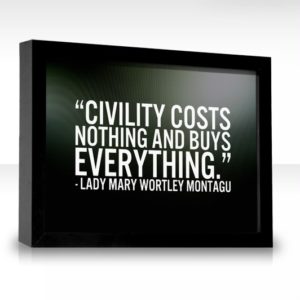
In a few days, voters will head to the polls in Delray Beach to fill two seats on the City Commission.
I’ve been observing elections in this town for 33 years now and friends can I tell you something? They are getting worse every year.
Nastier.
More expensive.
Devoid of ideas and vision.
It wasn’t always like this.
It doesn’t have to be like this.
And if we are smart, steps will be taken to change the tone of politics in our community.
Because make no mistake, these kind of campaigns leave a mark or should I say a stain on the soul of our community.
Delray Beach is at a crossroads.
The city needs hundreds of millions of dollars of infrastructure repairs and upgrades, sea level rise is a real threat to coastal neighborhoods, homelessness appears to be on the rise, our city staff has suffered from rampant turnover (the fire chief quit yesterday) and we seem to have stopped prioritizing economic development—as evidenced by an empty Office of Economic Development and ugly attacks on just about anyone who wants to invest in Delray Beach.
Despite the serious issues outlined above (and there are more) the three biggest issues in this election appear to be the positioning of a valet stand, how to handle traffic coming and going from a popular shopping center and the settlement of a lawsuit related to our Delray ATP tournament, a lawsuit– mind you– that the city was told it had no chance of winning despite spending hundreds of thousands of dollars. Your dollars.
We can and must do better.
Regardless of where you stand, we all seem to agree that Washington is an intractable mess.
The potential for change, solutions and innovation resides in our cities. But it seems our city is sliding more and more into the abyss of division and dysfunction. We are majoring in the minor when we have big rocks to move.
I’m sure the valet stand issue has merit and I know the traffic flow in and out of Delray Plaza is important to my good friends in Tropic Isle. But, there’s more to Delray, much more.
Where’s the vision?
Where’s the aspiration?
How will we weather climate change?
Do we care about jobs, attainable housing, and better schools?
Or is it all about development and traffic?
We act—if you believe the election mail pieces and social media chatter—as if all development is bad, no more is needed and that somehow we can resist change and pretend that property rights don’t exist.
Let’s talk about those issues shall we?
I get it, people hate traffic and congestion.
They also fear over development and losing the charm of our village by the sea. So do I, as do most of the people I know on both sides of the local divide. But we are not having meaningful conversations on these issues. We are yelling past one another. And it is getting us nowhere.
All candidates say they have a cure for traffic—but the truth is they don’t.
Personally, I find I can get around Delray pretty well, but I can’t say the same for Glades Road in Boca Raton or I-95 which can be parking lots.
Is Atlantic Avenue congested? You betcha. A lot of people worked very hard to make it so. You know what the opposite of congestion is? Empty streets and empty storefronts.
So sure, it takes some time to cruise the Avenue, but if you want to zip around town, please use our grid system, it works pretty well. We made a choice years ago to create a bustling, dynamic and vibrant downtown and we pulled it off.
There are trade-offs when you do that; especially when you succeed and Delray succeeded.
A pretty cool little downtown has been created and it has endured through the Great Recession, hurricanes and all sorts of political shenanigans.
So we may have to slow down– especially in season. We may get caught in traffic if we decide to take Atlantic from Swinton to A1A.
Next time you get annoyed—and I get annoyed too sometimes— consider all the jobs that have been created, all the tax dollars that have been generated, all the great businesses that have sprouted and think about how much more your home is worth than the days when this town was known as “Dull Ray”— a time when you could have gone bowling on Atlantic and not hit anything because it was empty and depressed.
So yes, the bridge will go up every 15 minutes or so, but guess what? It does go down and we will make it across. Parking may be tough—but that’s what they call a good problem to have. It means that people are flocking to your city’s central business district ringing cash registers and supporting the local economy.
We can add more parking infrastructure and pay for it too– if we want too. We can move toward solutions on issues big and small if we insist that our elected officials stop focusing on politics and each other and start focusing on serving the community. All of the community—not just their base of supporters.
As for development, I can understand the concern. But I think the way we are having this conversation is all wrong. All we have to show for it is years of frustration and anger.
Here are some facts to frame the situation:
Things change, it’s the only constant.
Property gets developed and redeveloped.
Owners of property have rights to develop that property within the rules set forth in our codes.
We do not allow tall buildings like our neighbors in Boynton Beach and Boca Raton do. But we do allow buildings that are 54 feet in height in some areas of our downtown.
I have never seen a developer get a height variance. Never.
I have never seen them get a waiver for density either.
I have seen developers create ridiculous inconveniences for long periods of time during construction and that’s something that needs to be looked at.
We had one project that took up a block and a half of parking for a decade right smack in front of small businesses and right now we have a hotel project blocking half of Pineapple Grove which damages a lot of very cool independent mom and pop businesses. There has to be a better way.
There also has to be a better way to discuss development and a better way to disagree on the issues without burning each other’s houses down.
We have to elevate the conversation and not make development a zero sum game where either the investor or the residents lose. We can create win-win scenarios but it will require us to agree that we must be civil when we discuss development or anything else controversial in our community.
Just because you favor a project does not mean that you are on the take or corrupt, it might just mean you like the project and feel it’s needed. Conversely, if you oppose something you are not necessarily a NIMBY, unless of course you oppose everything then maybe the shoe fits.
All I know is right now, everyone seems miserable and I think we need to reframe how we discuss these issues.
We have had a few spectacularly crappy developers come to town. They tend to not build their projects, because they don’t have the requisite skill set to do so.
But we have also had some really talented developers work in Delray, a few who have chosen to live here. While we have had a few developers who have acted like strip miners, taking every morsel and giving little to nothing back, many have been extraordinarily generous with their time and their philanthropic donations.
They have created some pretty special projects too. They have contributed to the vibrancy and to the tax base while taking spectacular risk.
If we chase away all development and treat every project as if it will kill Delray–we can count on taxes increasing and needed projects and services not being funded.
We desperately need— and I believe we desperately crave —real discussion on things like design (example: should we have modern homes on historic Swinton Avenue?), traffic flow, floor area ratios, density and uses.
Right now, there is a one way conversation taking place on social media and in the campaigns that tends to be lacking in facts, context and balance. Discussions about our CRA are especially nauseating because that organization has been invaluable to Delray Beach. I admit to bias on that front, but if you scratch beneath the surface on just about everything that has been accomplished in east Delray over the past 30 plus years you will find the CRA as a driving force for good. Has the agency been perfect? Not on your life. But subtract the agency from the Delray story and our story looks a whole lot different and I would argue a whole lot worse.
But everything begins and ends with the five people we elect to the commission. Get it right and good things happen. Get it wrong….well you can figure it out. Either way, we have to improve the tone of the town.
I make this statement based on watching this stuff for 33 years.
The fact that we are locked in a cycle marked by the politics of personal destruction ought to give us all pause. Because this becomes a spiral to the bottom.
Not only will good people not run for office, they will shy away from the process entirely which means serving on boards, volunteering for key non-profits etc. I would argue this is already happening.
Without casting aspersions, we are seeing some of the ripple effects of the nasty political climate in the sheer number of inexperienced candidates who are running for office in recent cycles.
I maintain and strongly advise that the job of city commissioner is not an entry level position. It is hard to be a good commissioner if you have not put the time in to learn about how the city functions, where it has come from and where it’s going.
You can be educated, sincere, driven and caring—but there is no substitute for time spent in the trenches. There are many candidates running this year that we have never seen involved in past visioning exercises, key boards and organizations. They are introducing themselves to the community in one breath and asking for your vote in the next.
It is important for candidates to have experience before they are given the keys to a $100 million plus budget and responsibility for major decisions that impact our quality of life and our future.
It is also important for the community to get to know the candidates. Do they play well with others? Will they show up at meetings, will they do their homework, can they listen? If they lose a vote, will they move on or will they declare war on those who disagree with them and spend their terms seeking revenge?
There’s simply no way of knowing if we have not seen how they approach community service.
By the way, there are examples for every terrible scenario I just listed—commissioners who are AWOL at key meetings and commissioners or their surrogates who hunt, harass and bully those with whom they disagree.
I am not advocating that we turn politics into some sort of genteel afternoon tea; that’s unrealistic and it never existed even in the good old days. So if you are a bully you should be called out for your behavior. If you have a past you probably should expect it to surface and if you have voted poorly or made mistakes you should be called to account.
Issues are fair game too.
Tough debate on the issues is fair, but we seem fixated on personalities, feuds and alliances.
Lately, I haven’t seen much substantive debate. So I really can’t tell where the candidates stand other than they oppose taxes, crime, traffic and developers. I don’t see any real solutions or any new ideas.
We need both.
Desperately.
I would add that we need aspiration as well.
If you’re ambition as an election official is to block every project, I’d like to ask what you’d like to see happen. If your unofficial tag line is “I’m in the boat, pull up the ladder” when it comes to housing projects, I’d like to know what we tell young families, police officers, teachers and our kids when they ask us where they can live in our city.
I’d like to know how you will pay for hundreds of millions of dollars in infrastructure repairs and needed services if you don’t build the tax base, down zone already underdeveloped corridors and pledge to cut taxes. If you think you can, you are either lying, terribly naive or you are a magician. I haven’t met too many magicians running for local office.
I think you get the gist.
Wednesday is the day after the election. That’s when—win or lose—we ought to begin a new and better conversation.
The current model isn’t working.
It’s not village like, it doesn’t address our needs and it won’t position us to seize opportunities or solve problems.








